
DANISH SHIPPING 2001
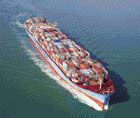
Danish Shipping
The steady progress recorded by Danish shipowners generally has
enabled continued consolidation of the industry. Last year the
industry increased its earnings by 70 per cent, resulting in a
foreign-currency turnover of more than 10 billion USD. About one-half
of revenue derives from vessel operations under national flag
while the remainder is generated by vessels chartered from abroad.
Today, shipping is Denmark's second largest export industry, with
the combined Danish shipping industry ranking among the ten largest
in the world. It is estimated that Danish shipowners and their
overseas affiliates together operate a fleet of 20-25 million
tonnes deadweight.
The 600 vessels registered under Danish flag, with a record deadweight
tonnage totalling 8 million tonnes, rank among the most technologically
advanced in the world. The ongoing newbuilding programme of 70
vessels, valued at almost 3 billion USD, means the average age
of the Danish merchant fleet is as low as seven years. Compared
to an international average of 13 years, this makes the Danish
fleet also one of the most modem merchant fleets in the world.
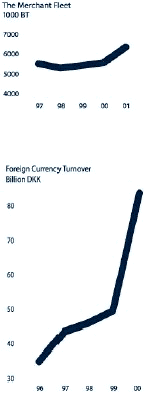 More than 95 per cent of the worldwide shipping activities of
Danish shipping companies consists of cross-trade operations between
foreign ports. The USA continues to be the single most important
market for Danish shipping, closely followed by Japan and, increasingly,
China. The EU as a block is also an important market for Danish
shipping companies, although 75 per cent of the turnover stems
from activities that do not include calls at European ports. Danish
owners operate in practically all ports the world over, servicing
local industry and shippers' interests.
More than 95 per cent of the worldwide shipping activities of
Danish shipping companies consists of cross-trade operations between
foreign ports. The USA continues to be the single most important
market for Danish shipping, closely followed by Japan and, increasingly,
China. The EU as a block is also an important market for Danish
shipping companies, although 75 per cent of the turnover stems
from activities that do not include calls at European ports. Danish
owners operate in practically all ports the world over, servicing
local industry and shippers' interests.
Danish owners operate a full-scale container fleet whose operations
are based mainly on door-to-door logistics. However, their services
encompass almost every aspect of maritime activities: ro-ro and
passenger operations, specialized product carrier services, cable-
laying vessels, salvage and offshore supply services, traditional
bulk, tanker trade, general cargo and reefer activities. Danish
owners are also engaged in related activities such as shipbuilding,
offshore drilling and production, warehousing, storage, container
port operations, rail transport, inland distribution logistics
and buying and selling ships.
The Danish shipping industry has generally maintained its competitive
edge by investing in technologically advanced vessels, employing
highly skilled personnel and utilizing the know-how acquired due
to Denmark's longstanding maritime traditions.
 Over the last decade,
the key figures for tonnage, turnover and employment have all
increased, matched by a corresponding reduction in the average
age of the Danish merchant f1eet. Shipping operations have been
the mainstay of the entire maritime industry, upholding the role
of Danish shipping companies and maritime authorities as important
players in national and international shipping arenas.
Over the last decade,
the key figures for tonnage, turnover and employment have all
increased, matched by a corresponding reduction in the average
age of the Danish merchant f1eet. Shipping operations have been
the mainstay of the entire maritime industry, upholding the role
of Danish shipping companies and maritime authorities as important
players in national and international shipping arenas.
INTERNATIONAL TRADE
Freedom of the seas and unimpeded access to maritime trade lanes
are crucial to maritime service providers and to international
trade in general. In recent years, most governments and maritime
authorities have become more aware of the advantages of such liberal
principles. The industrialized countries of the OECD have traditionally
pursued the principle of free market access, and other regions
of the world such as South America and the Far East are now increasingly
realizing the benefits for their economies of allowing their overseas
trade to be serviced by the most efficient shipping companies.
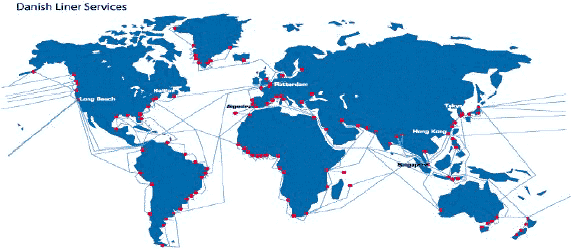
Despite the general trend towards liberalization in world trade,
evidenced by the recent Chinese and Russian negotiations about
WTO membership, it is desirable to continue working for the overall
liberalization of international shipping through the WTO in order
to secure a better legislative framework for what is already a
fairly liberal environment.

It is important to sustain efforts
to create effective conditions for free and fair competition in
the maritime industry. Surprisingly, the US government seems reluctant
to include maritime services in a WTO agreement despite largely
granting free and unrestricted access to the all-important US
shipping markets.
Some parts of the world still pose many obstacles to efficient
maritime operations, primarily West Africa and a few countries
in the Far East. It is imperative that international organizations
such as the WTO, OECD and IMF/World Bank regularly address the
issue and that the EU enters into a closer dialogue with these
countries in order to promote sea-borne trade. Danish shipowners
will support any general initiative to ensure that external maritime
relations remain on the international agenda.
Although there is free market access to most international trade
lanes, vast potential exists in several regions to further liberalize
coastal trade, port services and inland transport services. Even
though WTO negotiations are largely confined to international
deep-sea trade, governments should stilI address the coastal and
inland service issues, at least bilaterally, and agree on measures
to optimize operations such as feeder and inland trucking services.
Efficient and competitive port services are another important
factor in this context.
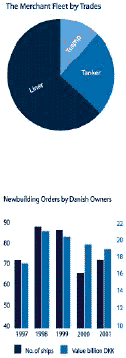 Port policy-makers must recognize that, since ships are not the
only beneficiaries of port services, certain port-related costs
should be borne by cargo-owners and the local community. Today,
port charges are a substantial shipping cost, and shipowners'
contributions should not exceed the cost of the port services
actually provided. The recent European Commission initiative to
improve auxiliary services in ports will hopefully provide a yardstick
for port operations and thus promote sea transport in general.
Port policy-makers must recognize that, since ships are not the
only beneficiaries of port services, certain port-related costs
should be borne by cargo-owners and the local community. Today,
port charges are a substantial shipping cost, and shipowners'
contributions should not exceed the cost of the port services
actually provided. The recent European Commission initiative to
improve auxiliary services in ports will hopefully provide a yardstick
for port operations and thus promote sea transport in general.
Efficiency in the international transport service system can also
be enhanced in other areas. Customs operations must not unnecessarily
hamper the efficient, free and rapid flow of trade. International
solutions must be found to enable shipowners to disembark stowaways
exploiting the international transport system to leave their native
country. Pirate attacks on merchant vessels still occur in a few
regions of the world. More international pressure must be exerted
on governments, particularly those responsible for the areas in
which these often wel1-organized pirate operations are based,
in order to combat such practices.
REGULATORY POLICY
 Apart from artificial barriers to free market access, direct subsidies
have a negative impact on the international shipping industry
in that they distort competition. It is vital that the international
Col11lnunity is seen to combat the problem of subsidies, particularly
in relation to shipbuilding. Heavy shipbuilding subsidization
will undermine the shipping industry if new tonnage is ordered
and put into service without sufficient economic justification.
A subsidy race in this sector must be avoided and the current
problem of subsidies to South Korean yards must be resolved without
reintroducing subsidies in other countries.
Apart from artificial barriers to free market access, direct subsidies
have a negative impact on the international shipping industry
in that they distort competition. It is vital that the international
Col11lnunity is seen to combat the problem of subsidies, particularly
in relation to shipbuilding. Heavy shipbuilding subsidization
will undermine the shipping industry if new tonnage is ordered
and put into service without sufficient economic justification.
A subsidy race in this sector must be avoided and the current
problem of subsidies to South Korean yards must be resolved without
reintroducing subsidies in other countries.
Direct subsidies to shipowners are likewise a potential threat
to the viability of the shipping sector and must be avoided. The
EU has adopted a balanced policy of banning direct subsidies but
allowing alleviating of the public burdens imposed on the shipping
industry .Public taxes have been reduced for shipping personnel,
and the revenue taxes levied on shipping companies stabilized
through so-called tonnage tax systems. Today, most European countries
have introduced tonnage tax systems and it is hoped that Denmark
too will follow suit in the foreseeable future. Such a policy
should, moreover, be a benchmark for international standards to
prevent direct subsidies being granted to the shipping sector
while providing a framework for an internationally competitive
industry.
The competition rules applying to the international shipping industry
must respect the need for international comity. The main issue
is therefore to maintain general anti-trust immunity for cooperation
agreements in the shipping sector. This principle is being pursued
in all major international trading centres in recognition ofthe
capital-intensive, international nature of shipping. In a huge
worldwide market, maritime transport can only be rationalized
and optimized if unhindered cooperation is assured by adherence
to well-defined competition rules. This concept seems to be accepted
in the USA, the EU and Japan where a balanced approach to maritime
competition rules has prevailed. A clear legal framework in this
area is a prerequisite if shipowners are to avoid inadvertently
infringing competition law, and fines should not be levied on
the shipping industry on the basis of a retroactive "reading"
of hitherto unclear competition rules.
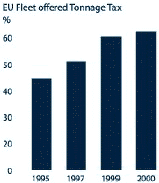
All policy relating to maritime regulations must be considered
in an international context. This applies to a most any regulatory
measure -economic, social or technical -anywhere in the world,
in any international shipping marketplace. National and regional
initiatives must respect the global nature of shipping. Shipping-policy
decisions should be made by the international community through
the WTO, safety-policy decisions by the United Nations' International
Maritime Organization (IMO), and decisions on social matters in
the maritime sector by the United Nations' Labour Organization
(ILO ).
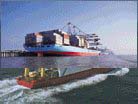 In its decisions on social matters, the ILO should aim to set
meaningful, enforceable standards for the basic conditions of
employment contracts. Such guidelines should particularly address
the rights of seafarers based on internationally applicable standards.
In its decisions on social matters, the ILO should aim to set
meaningful, enforceable standards for the basic conditions of
employment contracts. Such guidelines should particularly address
the rights of seafarers based on internationally applicable standards.
SAFETY AND ENVIRONMENT
The IMO is the vehicle for promoting safety at sea and environmental
protection. Numerous conventions, codes and recommendations covering
all aspects of safety and environmental protection have been adopted
at international level.
Nevertheless, one of the most significant problems in relation
to safety at sea is the lack of compliance with the comprehensive
body of international regulations. In a number of countries, the
f1ag state control carried out by national maritime authorities
or appointed classification societies needs to be further enhanced.
More efficient port state control might be achieved if authorities
strengthened their systems for detainment of substandard vessels.
Finally, for shipping companies, the implementation of the International
Safety Management Code (ISM) has clearly been an important step
towards further enhancing safety at sea.
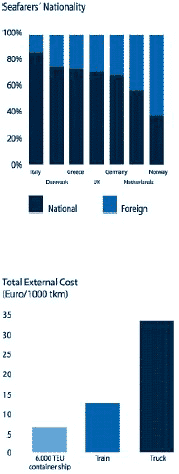 It is important to ensure that existing regulations are properly
adhered to rather than establish new regulations that through
f1ag state or port state control impose additional burdens on
shipowners already complying with existing regulations. Efforts
should also focus on increasing awareness, not only among national
maritime authorities and shipowners, but also among customers
and port operators who often are behind unwarranted demands for
substandard shipping.
It is important to ensure that existing regulations are properly
adhered to rather than establish new regulations that through
f1ag state or port state control impose additional burdens on
shipowners already complying with existing regulations. Efforts
should also focus on increasing awareness, not only among national
maritime authorities and shipowners, but also among customers
and port operators who often are behind unwarranted demands for
substandard shipping.
Recent oil spills in European waters have increased political
pressure on governments to introduce stricter regulations to prevent
the recurrence of such disasters. While it seems worth pursuing
the EU initiatives to strengthen port state control in compliance
with international regulations and speed up the phasing-out of
single-hulled tankers through the IMO, it is of paramount importance
to avoid regional measures which may not reflect international
priorities. The IMO is to be commended on its efforts to seek
international solutions, also in such complex matters as the current
proposal to phase out single-hulled tankers. European Commission
proposals to establish burdensome reporting systems and an EU
maritime agency will not necessarily result m better safety but
merely lead to more bureaucracy and regionalization. Any changes
in the overall international liability and compensation system
must respect the principle of shared liability of ship- and cargo-owners.
A balanced assessment of this complex issue based on mutual international
understanding is a vital precondition sine qua non.
Shipping is basically an environmentally friendly mode of transport,
but the combined international regulations on safety and environmental
protection must be more strictly enforced to guarantee the seaworthiness
of fleets and their compliance with environmental regulations.
The recruitment of well-qualified seafarers and an internationally
approved system for an all-round shipping education are other
important issues. Providing the best conditions for health and
safety at sea that respect the unique nature of the work will
also enhance safety at sea and environmental protection.
This publication closed for
contributions on 3 May 2001
J. Fritz Hansen
M. Lund
|
|
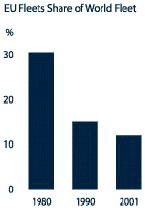
|